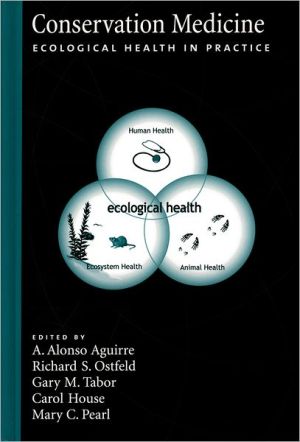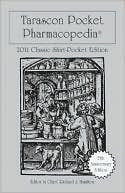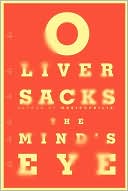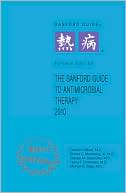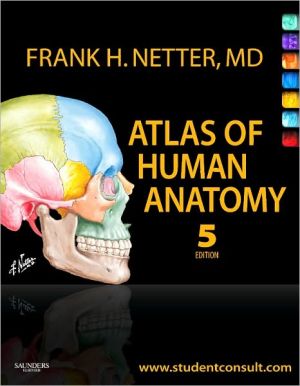Conservation Medicine: Ecological Health in Practice
Conservation medicine is an emerging discipline, focussing on the intersection of ecosystem health, animal health, and human health. Work in the biomedical and veterinary sciences is now being folded into conservation biology; to explore the connections between animal and human health; trace the environmental sources of pathogens and pollutants; develop an understanding of the ecological causes of changes in human and animal health; and understand the consequences of diseases to populations...
Search in google:
Many aspects of the new field of conservation medicine, defined here as the pursuit of the health of ecosystems and their inhabitants, are covered in this substantial volume. The 29 chapters are devoted to general and specific topics, including: the spread of diseases through ecotourism, ballast water dumping, insects, and other causes; the impact of social parameters, ecological change, and climate trends on species dynamics for controlling disease; emerging and resurgent infectious diseases as a manifestation of ecological health; and monitoring tools. The breadth of the volume ensures a broad readership of scientists as well as the general reader. The international group of contributors includes scientists at research institutions and environmental and wildlife centers. Annotation c. Book News, Inc., Portland, OR Doody Review Services Reviewer:Julia K Whittington, DVM(University of Illinois College of Veterinary Medicine)Description:This multiauthored book's 29 chapters are divided into five sections covering ecological health and change, monitoring ecological health, ecological health and humans, implementing conservation medicine, conservation medicine and challenges for the future.Purpose:It is intended to be a primer for those persons interested in promoting ecological health. This book goes far beyond that goal as it addresses issues critical for all persons, not just the practitioners for whom it is intended. The book provides a wonderful overview of the evolving, broad-reaching discipline of conservation medicine.Audience:It is written for practitioners and students in the fields of health and ecology, but the potential audience that would benefit is much greater. Any person, scientist or otherwise, interested in ecology, human medicine, veterinary medicine, public health, conservation biology, or ecosystem health would gain from and thoroughly enjoy the insight and knowledge imparted in this book. The contributing author list is impressive and the information they set forth is the collective fruit of international scholarly work.Features:At its heart is the central idea that conservation medicine is the discipline that embraces the intertwined fields of ecosystem, animal, and human health. From there, the authors seek to explore the many different ways that all living organisms interact and to illustrate the cause and effect relationships they develop. No one field or discipline is emphasized more than the others because they are all important and related. Especially insightful are the chapters discussing emerging and infectious diseases. The authors and editors have done an excellent job of using ecological models or studies to illustrate important and relevant topics. The only shortcoming of this book is that it ended too soon.Assessment:This is an extremely valuable tool for practitioners in ecosystem health and management as well as in medicine. The thought-provoking topics are well organized and informative. This book will be instrumental in training future professionals interested in conservation medicine.
ForewordContributorsIEcological Health and Change1Introduction32Defining Conservation Medicine83Conservation Medicine: The Birth of Another Crisis Discipline174Biodiversity, Climate Change, and Emerging Infectious Diseases275Emerging Infectious Diseases: A Key Role for Conservation Medicine406Effects of Endocrine Disruptors on Human and Wildlife Health62IIMonitoring Ecological Health7Monitoring the Health and Conservation of Marine Mammals, Sea Turtles, and Their Ecosystems798Disease Monitoring for the Conservation of Terrestrial Animals959Emergence of Infectious Diseases in Marine Mammals10410Viruses as Evolutionary Tools to Monitor Population Dynamics11811Assessing Stress and Population Genetics Through Noninvasive Means13012Animal Behavior as a Tool in Conservation Biology145IIIEcological Health and Humans13Global Ecological Change and Human Health16714Biodiversity and Human Health18215Vector-Borne Infections and Health Related to Landscape Changes19416Ecological Context of Lyme Disease: Biodiversity, Habitat Fragmentation, and Risk of Infection20717Zoonotic Infections and Conservation22018Chronic Effects of Toxic Microalgae on Finfish, Shellfish, and Human Health229IVImplementing Conservation Medicine19Ecological Health and Wildlife Disease Management in National Parks25320Wildlife Health, Ecosystems, and Rural Livelihoods in Botswana26521Zoological Parks in Endangered Species Recovery and Conservation27622The Mountain Gorilla and Conservation Medicine28223Linking Human and Ecosystem Health on the Amazon Frontier29724Deer Tick-Transmitted Zoonoses in the Eastern United States310VConservation Medicine and Challenges for the Future25Biodiversity in Biomedical Research32726Introducing Ecosystem Health into Undergraduate Medical Education34527Ecotourism: Unforeseen Effects on Health36128Global Ecological Integrity, Global Change, and Public Health37229Wildlife Health and Environmental Security: New Challenges and Opportunities383Index397
\ From The CriticsReviewer: Julia K Whittington, DVM(University of Illinois College of Veterinary Medicine)\ Description: This multiauthored book's 29 chapters are divided into five sections covering ecological health and change, monitoring ecological health, ecological health and humans, implementing conservation medicine, conservation medicine and challenges for the future.\ Purpose: It is intended to be a primer for those persons interested in promoting ecological health. This book goes far beyond that goal as it addresses issues critical for all persons, not just the practitioners for whom it is intended. The book provides a wonderful overview of the evolving, broad-reaching discipline of conservation medicine.\ Audience: It is written for practitioners and students in the fields of health and ecology, but the potential audience that would benefit is much greater. Any person, scientist or otherwise, interested in ecology, human medicine, veterinary medicine, public health, conservation biology, or ecosystem health would gain from and thoroughly enjoy the insight and knowledge imparted in this book. The contributing author list is impressive and the information they set forth is the collective fruit of international scholarly work.\ Features: At its heart is the central idea that conservation medicine is the discipline that embraces the intertwined fields of ecosystem, animal, and human health. From there, the authors seek to explore the many different ways that all living organisms interact and to illustrate the cause and effect relationships they develop. No one field or discipline is emphasized more than the others because they are all important and related. Especially insightful are the chapters discussing emerging and infectious diseases. The authors and editors have done an excellent job of using ecological models or studies to illustrate important and relevant topics. The only shortcoming of this book is that it ended too soon.\ Assessment: This is an extremely valuable tool for practitioners in ecosystem health and management as well as in medicine. The thought-provoking topics are well organized and informative. This book will be instrumental in training future professionals interested in conservation medicine.\ \ \ 4 Stars! from Doody\ \
